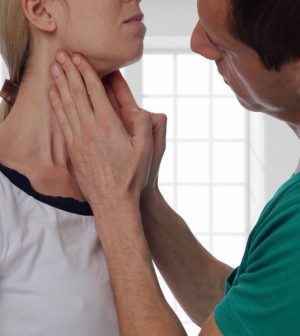- Recognizing the Signs of Hypothyroidism
- 10 Strategies to Overcome Insomnia
- Could Artificial Sweeteners Be Aging the Brain Faster?
- Techniques for Soothing Your Nervous System
- Does the Water in Your House Smell Funny? Here’s Why
- Can a Daily Dose of Apple Cider Vinegar Actually Aid Weight Loss?
- 6 Health Beverages That Can Actually Spike Your Blood Sugar
- Treatment Options for Social Anxiety Disorder
- Understanding the Connection Between Anxiety and Depression
- How Daily Prunes Can Influence Cholesterol and Inflammation
New Thyroid Eye Disease Treatment Could Harm Hearing

The first drug approved in the United States to treat thyroid eye disease may come with an unwelcome side effect for many: A small, new study finds that up to two-thirds of patients who take the medication experience hearing problems.
Teprotumumab (Tepezza) was approved by the U.S. Food and Drug Administration in January 2020. In two clinical trials conducted before FDA approval of the drug, hearing problems were reported in 10% of patients. But this new study found that the rate could be as high as 65%, the researchers said.
The findings were presented recently at The Endocrine Society’s virtual annual meeting.
Thyroid eye disease is an autoimmune disease in which the eye muscles and fatty tissue behind the eye become inflamed, and is primarily associated with an overactive thyroid gland due to Graves’ disease.
Symptoms of thyroid eye disease include dry, watery, red or bulging eyes, a “stare,” double vision, difficulty closing the eyes and vision problems.
Teprotumumab is given to patients once every three weeks for a total of eight infusions, and it has been shown to provide significant benefits to patients, the study authors said in a society news release.
This latest study included 26 patients treated with at least four infusions of teprotumumab. Seventeen (65%) of the patients reported new hearing problems.
The most common were hearing loss (23%), ringing in the ears (27%), ear plugging sensation (12%) and autophony, an unusually loud hearing of a person’s own voice (29%). The symptoms developed after an average of 3.6 infusions of teprotumumab.
Of the 17 patients with new hearing issues, four had new or worsening sensorineural hearing loss, which results from damaged hair cells in the inner ear. Two of those four patients had improvements in symptoms at one and six months, the findings showed.
Three patients had patulous eustachian tube, a disorder in which the channel that runs between the middle ear and back of the nose and throat stays open. Normally, these eustachian tubes are closed and open only occasionally to regulate air pressure around the ear drum. After three months, symptoms of this condition improved, but did not completely disappear, the researchers said.
The study’s follow-up period of three months after stopping the drug is too short to assess whether such hearing problems can be reversed, said senior study author Dr. Andrea Lora Kossler. She is an assistant professor of ophthalmology at Stanford University School of Medicine, in California. Future studies will evaluate risk factors for hearing loss and the reversibility of symptoms, she noted.
Research presented at medical meetings should be considered preliminary until published in a peer-reviewed journal.
More information
The National Organization for Rare Disorders has more on thyroid eye disease.
SOURCE: The Endocrine Society, news release, March 20, 2021
Source: HealthDay
Copyright © 2026 HealthDay. All rights reserved.










